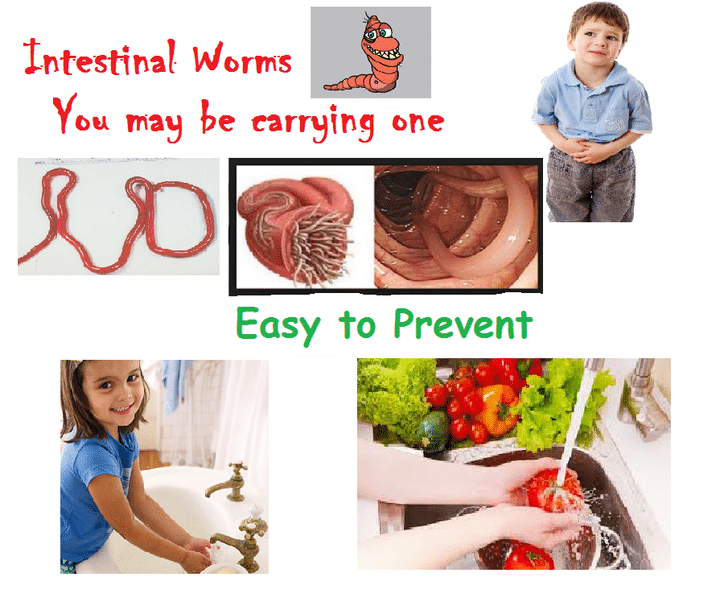Get the App
For Doctors
Login/Sign-up
Last Updated: Aug 29, 2019
BookMark
Report
Intestinal Worms – A silent Disease " You may be carrying one"
• Worm infestation is one of the common problems not only in children but also in adults. They are major cause of childhood anemia and malnutrition, which leads to growth retardation, cognitive impairment, and poor academic performance.
• Worm infections are more prevalent among school children aged 5-14 years. They are seen in about 50% in urban and 68% in rural school children.
• Children are carrying worms in their intestine without their knowledge. Worms stick to intestine and keep on sucking blood and other nutrition. There are many types of worm like roundworm, thread worm, pin worm, hook worm etc. which can cause infection.
• Severity of infection depends on worm burden. A large majority of cases are asymptomatic. Infection is first identified when parents notice worms in stool .
• They can cause serious complication like Intestinal obstruction, liver disease, Pneumonia and even brain infections.
How we get worm infection?
• When people defecate in the open, millions of roundworm eggs are deposited in the soil or environment. They cans be carried around freely by dust, wind and rain.
• The infective eggs enter into the human body when we swallow or ingest fecal contaminated water or food. Or we pass onto food by infected hands, dirt under the nails, cups and plates.
• A child playing in a compound picks up infective eggs through dirty hands or play objects.
• Dirty human feet and animals walking in and out of houses bring the roundworm eggs into the home, and thus contaminate the home environment.
• In addition, flies, cockroaches and rats are also common vehicles that carry the roundworm eggs into the home where they infect humans.
• swimming in polluted rivers, eating without washing hands, geophagy (eating soil), eating unwashed fruits and vegetables.
In endemic areas eggs contaminate numerous domestic and public sites, including the following-
• Chopping boards • Coins• Door handles • Dust• Fingers• Fingernail dirt• Fruits and Vegetables
• Furniture • Paper money• Pickles• Public baths and restrooms• Public transportation (eg, buses)
• School rooms• Wash basins
How to prevent it?
• People need to adopt good hygiene habits by washing both hands properly with soap before eating or feeding children and after defecation.
• Wash vegetables thoroughly, especially when eating them raw.
• Cook food and vegetables properly to destroy the worm eggs.
• Hygiene and health education of school children is the most important activity to motivate children to change their behaviors and to take home the good hygiene habits.
• They can be shown photos of worm’s diseases, so that they can be easily persuaded to follow good hygienic habits.
How to identify worm infection?
• 85 % of patients are asymptomatic so it remains undiagnosed.
• Stool microscopic examination, for worms egg is a simple and cheap method of diagnosis .
• If the child is looking anemic, malnourished, weak, stomach pain or having anal itching, get his stool test done.
Treatment –
• Worm Infection can be easily cured. We have very good medicines available for worm infections.
• Consult your pediatrician for medication advice.
• But medication does not prevent re-infection.
• So the main treatment is, Prevention through Education of children and parents about importance of good hygiene.
Take Home message
Make it your family culture - Wash Hands with soaps just before eating food.
Wash fruits and vegetables thoroughly before eating.
For any queries, feel free to contact at penguinclinic.com
• Worm infections are more prevalent among school children aged 5-14 years. They are seen in about 50% in urban and 68% in rural school children.
• Children are carrying worms in their intestine without their knowledge. Worms stick to intestine and keep on sucking blood and other nutrition. There are many types of worm like roundworm, thread worm, pin worm, hook worm etc. which can cause infection.
• Severity of infection depends on worm burden. A large majority of cases are asymptomatic. Infection is first identified when parents notice worms in stool .
• They can cause serious complication like Intestinal obstruction, liver disease, Pneumonia and even brain infections.
How we get worm infection?
• When people defecate in the open, millions of roundworm eggs are deposited in the soil or environment. They cans be carried around freely by dust, wind and rain.
• The infective eggs enter into the human body when we swallow or ingest fecal contaminated water or food. Or we pass onto food by infected hands, dirt under the nails, cups and plates.
• A child playing in a compound picks up infective eggs through dirty hands or play objects.
• Dirty human feet and animals walking in and out of houses bring the roundworm eggs into the home, and thus contaminate the home environment.
• In addition, flies, cockroaches and rats are also common vehicles that carry the roundworm eggs into the home where they infect humans.
• swimming in polluted rivers, eating without washing hands, geophagy (eating soil), eating unwashed fruits and vegetables.
In endemic areas eggs contaminate numerous domestic and public sites, including the following-
• Chopping boards • Coins• Door handles • Dust• Fingers• Fingernail dirt• Fruits and Vegetables
• Furniture • Paper money• Pickles• Public baths and restrooms• Public transportation (eg, buses)
• School rooms• Wash basins
How to prevent it?
• People need to adopt good hygiene habits by washing both hands properly with soap before eating or feeding children and after defecation.
• Wash vegetables thoroughly, especially when eating them raw.
• Cook food and vegetables properly to destroy the worm eggs.
• Hygiene and health education of school children is the most important activity to motivate children to change their behaviors and to take home the good hygiene habits.
• They can be shown photos of worm’s diseases, so that they can be easily persuaded to follow good hygienic habits.
How to identify worm infection?
• 85 % of patients are asymptomatic so it remains undiagnosed.
• Stool microscopic examination, for worms egg is a simple and cheap method of diagnosis .
• If the child is looking anemic, malnourished, weak, stomach pain or having anal itching, get his stool test done.
Treatment –
• Worm Infection can be easily cured. We have very good medicines available for worm infections.
• Consult your pediatrician for medication advice.
• But medication does not prevent re-infection.
• So the main treatment is, Prevention through Education of children and parents about importance of good hygiene.
Take Home message
Make it your family culture - Wash Hands with soaps just before eating food.
Wash fruits and vegetables thoroughly before eating.
For any queries, feel free to contact at penguinclinic.com



+1.svg)
